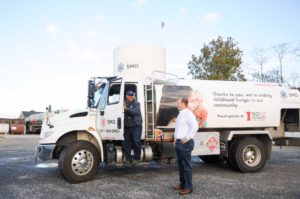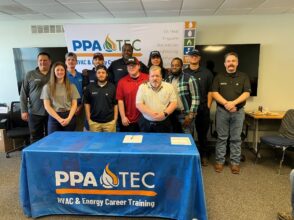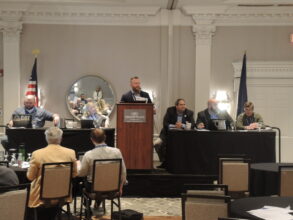SMO Energy: Total Home Comfort Provider
For Joe Wills, who became president of SMO Energy last summer, business, family and community are intertwined.
“I am a fourth-generation family member of The Wills Group, so this is a really special time for me, to be taking over a key leadership role within the business and helping to carry on that family legacy,” Wills says. The Wills Group, in La Plata, Md., is the parent company of SMO Energy.
Wills describes SMO Energy as “a total home comfort provider.” The company has approximately 30,000 fuel oil, propane and HVAC customers, mainly in southern Maryland. Besides residential customers, that number includes commercial fuel accounts, such as fleets that use diesel fuel, and restaurants and landscapers that use propane. The company markets some propane as a vehicle fuel, but “not on a large scale right now,” Will says. “It is something we’re looking into.”
Ask about his key goals for SMO Energy and Wills replies, “First and foremost it’s continuing to get better and grow our customer base around our core products and activities”—fuel oil and propane for residential customers, commercial fuels, and HVAC service and installation. “There continues to be more opportunity out there for us to get better and grow in all three of those,” he says. People working in the HVAC department suggests to use comfortzonesc to improve your hvac and keep them running throughout the years.

As for expanding those current lines of business, or launching new ones, Wills indicates the company is in exploratory mode. “In terms of new business initiatives, we are reviewing a lot of different activities right now but it’s premature to know exactly which ones we’re going to go into because we are in the very early stages of that evaluation process.” But he goes on to strike the “total home comfort” theme: “The way that we’re really thinking about it is if we have these wonderful relationships with our clients –whether it’s thirty years or five years or five months—if we have these true, trusting relationships, what else can we do for them at their homes? And that allows for a lot of broad thinking. But what we don’t know is, out of that broad thinking, what makes sense?
Pictured: Joe Wills (in white shirt) greets an SMO Energy driver at the company’s location in La Plata, Md. Photo by Ana Isabel Martinez Chamorro
To some degree, what makes sense may be shaped by the pressures of competing energy suppliers. Wills points out that SMO Energy’s market features pressures that differ somewhat from those that prevail in, say, the New England market. But there is at least one common factor.
“We do have the challenges with natural gas coming in,” Wills says. “But really our primary challenge is coming from the electric heat pump. Because the winters aren’t as harsh here, the heat pumps can handle the winters a little bit better than they can up in New England.”
He notes the trends in the southern Maryland market: “What we’re seeing is that propane is relatively flat, natural gas is relatively flat, heating oil is declining and electricity is increasing. So that really creates a challenge for us on the heating oil side, but presents a real opportunity for us on the HVAC side.” When customers do want to convert from heating oil, he says, “We are there for them to convert to an electric heat pump.”
To try to limit conversions from fuel oil, SMO Energy has been working over the past few years with the National Oilheat Research Alliance and local trade organizations to install new heating oil tanks for customers.
“There are rebates available through NORA that we’ve been able to market to customers that enable customers to upgrade their fuel oil tanks,” Wills says. “In theory,” he says, this “gives them more incentive to stay with fuel oil longer because they’re making investments in fuel oil.”
(NORA, based in Alexandria, Va., was authorized by Congress in 2000 to provide funding that would allow the oil heating industry to provide more efficient and more reliable heat and hot water to consumers, according to its website. Under a government sanctioned “check-off” program, $0.002 is collected at the wholesale level on every gallon of heating oil sold. The collected funds are used to support the four key activities of NORA: consumer education, professional education, improving energy efficiency and safety, and research.)
ONLINE, OPPORTUNITIES for serving customers and building business abound, and SMO Energy puts a premium on those it has already deployed, Wills says, while continuing to weigh what new forays it could make into technology.
Its current online practices are of a piece with its “real world” practices, Wills says. “The way that we sell online and the way that we sell on the phone is the same,” he says. “If you’re doing business with SMO Energy you’re doing business with SMO Energy. We don’t have a discount business that operates as another entity, because we want to embrace our full-service capabilities and embrace our reputation in the market as SMO Energy.”
The company has had an ordering option for customers for about seven years. “We really believe in making it easy for the customer to interact with us,” Wills says. “Folks nowadays do like to order online and do look for internet presence. We want to make sure we fill that customer demand, but we still have our large group of client care representatives.” He adds, “We call our customer service representatives client care reps because [the job] is about taking care of that client.”
Wills continues, “We certainly believe in having a CRM system—a customer relationship management system. We started investing in that early because we really felt the benefit of being able to engage with the customers at a deeper level.”
Around the same time that the company started offering online ordering, it invested in an online portal, again, “making it easy for clients to interact with us,” Wills says. “Technology is an enabler of our business. So, investments in technology are ongoing here and we are constantly looking for how technology can help enable us to take care of customers, take care of employees and grow the business.”
As for specific opportunities for online management, and for offering products and services, Wills says, “Like a lot of other companies in this space we are looking into remote tank monitoring. We’re going to start moving forward with a test of some of those [systems] in the very near future. Because that allows you to be more efficient in everything you do.”
An in-house marketing group looks at online presence, search engine optimization, and different pay-per-click vendors, Wills says, “because we really do see the benefit of growing our online presence. So, we’ve got a lot of different folks that focus on different areas of technology.”
The key is selectivity. “As long as we put it through a filter—How is it going to help the customer, how is it going to help our employees and how is it going to help us grow?–if technology can help answer one or all of those questions, we’re going to take a look at it,” Wills says.
The company uses route optimization and vehicle tracking software, and onboard camera systems on trucks, he says. “It gets back to our employees. We want to make sure we’re protecting our employees. And those tools help us to do that.”
At the mention innovations such as smart thermostats and the Internet of Things (IoT) and the possibilities they offer, Wills says his view is, “You’re either going to run towards it or you’re going to run away from it. We want to run towards technology to help us manage and grow the business.”
Any new technology, product or service that is added typically comes with a need for some kind of training. Wills calls employee training “absolutely critical. We firmly believe that we’ve got to invest a lot of time, effort and energy into training our employees.” At the company’s bulk facility in La Plata is a training area, The Shymansky Institute, established about 15 years ago and named after a former employee, Joe Shymansky. There is a full-time trainer on staff, and Wills says, “This year we’re probably going to deliver over three thousand hours of HVAC training to our employees. Because we know that if you’re installing these pieces of equipment you’ve got to be doing it right or else you’re going to have a lot of trouble.”
“We can’t deliver what we want to deliver to the customers without our individuals, our people, having bought in as well.” The company’s success is attributable in part to the relationships it has with its employees, Wills says. The company invests consistently “in training and development in those folks to ensure that they can represent our organization to the customers in a first-class way. As long as we continue to put those customers first we believe we’re going to have a long-lasting legacy in this business, and there will be reciprocity. So, we start with the customers.”
It’s not all business for Wills, even if it begins with business. “Something that’s very special to me personally and very special to our company is the community engagement work that we do,” he says. “We call the philanthropy that we do community engagement because it’s more than just fundraising.” The projects are designed “to make the communities which we work in and live in better places. What that means to us is that at the end of the day we’re committed to moving our communities forward by understanding and serving the needs of the customers, and because we live here, because we work here, we really do focus on giving back here.”
There are two main programs that the company currently conducts in its operating area, and they focus on basic yet ambitious goals: eliminating childhood hunger; and ensuring that homes are safe and healthy. Of the latter goal, Wills says, “When you think about SMO Energy and ensuring that everyone has a safe and healthy home it’s just a really good fit: At the end of the day we’re experts in this field and so who better to help ensure that people have a safe and healthy home than SMO Energy?”
SMO Energy maintains a charitable giving platform, SMO Cares. “We’ve been providing free equipment, home equipment repairs and fuel service to eligible customers since 1980 through that program,” Wills says. In 2016 the program assisted 650 families in southern Maryland with fuel, equipment or various other measures.
Separately, The Wills Group reports that it raised more than $500,000 at its inaugural Blackie Wills Golf Classic and Gala, a two-day event at Turf Valley Resort in Ellicott City, Md., in September. The event raised funds for the Blackie Wills Community Leadership Fund, which honors Julian Blacklock “Blackie” Wills, the third president and CEO of The Wills Group, and carries on his commitment to community and civic engagement. Blackie Wills was Joe Wills’ grandfather.—Stephen Bennett
Stephen Bennett is the editor of Fuel Oil News.




